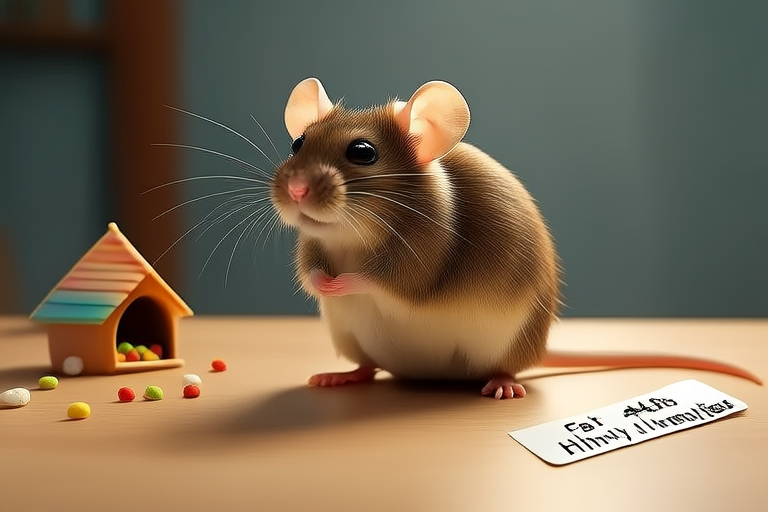5 Surprising Facts About Fancy Rats That Will Change Your Opinion
Fancy rats, also known as domesticated rats, have long been misunderstood. Often associated with disease and filth, these creatures have a rich history and complex behavior that many overlook. In this article, we delve into five surprising facts about fancy rats that will challenge your preconceived notions and offer a fresh perspective on these intelligent and social animals.
Fact 1: Fancy Rats Are Descendants of Wild Rats but Have Been Domesticated for Centuries
The journey of fancy rats from wild rodents to beloved pets is a fascinating tale rooted in history. These animals are descendants of the brown rat (Rattus norvegicus), which originated in Asia. The domestication process began centuries ago when humans started keeping them for various purposes, including as food, entertainment, and even as laboratory animals. By the 19th century, fancy rats were being bred specifically for their appearance and behavior, leading to the diverse range of colors and coat types seen today.
One of the earliest recorded instances of fancy rats as pets dates back to the Victorian era. Queen Victoria herself owned a pair of fancy rats, and they became fashionable among the upper classes. This trend continued into the 20th century, with fancy rats gaining popularity as companions due to their gentle nature and ease of care. Today, fancy rats are recognized by organizations like the American Fancy Rat and Mouse Association (AFRMA), which sets standards for breeding and shows.
Fact 2: Fancy Rats Are Highly Intelligent and Can Be Trained
Rats are often underestimated when it comes to intelligence, but studies have shown that they possess cognitive abilities comparable to those of dogs and primates. Their problem-solving skills and ability to learn new tasks make them ideal candidates for training. In one study, researchers at the University of Chicago found that rats could be trained to navigate mazes and perform simple tasks for rewards, such as food or praise.
Training sessions can include teaching rats to come when called, use litter boxes, or even perform tricks like fetching objects. One anecdote from a pet owner describes how her rat learned to push a button to receive a treat after just a few days of consistent training. This level of interaction not only strengthens the bond between human and animal but also demonstrates the rat’s adaptability and intelligence.
Fact 3: Fancy Rats Are Social Animals That Thrive in Pairs or Groups
Social interaction is crucial for the well-being of fancy rats. They are highly social animals that form strong bonds with both humans and other rats. In the wild, rats live in large colonies where they work together to find food and protect their territory. This social structure translates into captivity, where rats thrive in pairs or groups. A solitary rat may become stressed or exhibit behavioral issues without companionship.
Research has shown that rats housed in pairs or groups display lower levels of stress hormones compared to those kept alone. Additionally, rats raised in social environments tend to be more curious and exploratory. Anecdotes from pet owners often highlight the joy of watching their rats interact, play, and groom each other. These behaviors not only enhance the rats’ quality of life but also provide endless entertainment for their human caregivers.
Fact 4: Fancy Rats Are Clean Creatures That Spend Much of Their Time Grooming
Despite common misconceptions, fancy rats are actually quite clean animals. They spend a significant portion of their day grooming themselves and each other, much like cats. This behavior helps keep their coats in good condition and maintains hygiene within their living space. In fact, rats are so meticulous about cleanliness that they will avoid areas where they perceive there to be contamination.
Studies have shown that rats have a keen sense of smell and can detect odors that are imperceptible to humans. This heightened sense of smell plays a crucial role in their grooming habits. For example, rats can identify areas of their bodies that need extra attention and will focus their grooming efforts accordingly. Pet owners often remark on how clean and odor-free their rats remain, even without regular baths.
Fact 5: Fancy Rats Exhibit Complex Emotions and Form Strong Bonds With Humans
Rats are capable of experiencing a wide range of emotions, from happiness and excitement to fear and sadness. They can form strong bonds with their human caregivers, responding positively to affection and attention. One notable study conducted by neuroscientist Jaak Panksepp demonstrated that rats experience joy and seek out play when given the opportunity. This finding challenges the notion that rats are cold or indifferent animals.
Anecdotes from pet owners frequently mention how their rats show signs of affection, such as nuzzling or sitting close to them. Some rats even develop preferences for certain individuals within their household. One owner recounted how her rat would always seek her out when she returned home from work, demonstrating a clear preference for her over others. These emotional connections underscore the importance of providing rats with loving homes and companionship.
Call to Action
Fancy rats are far more than just cute pets; they are intelligent, social, and emotionally complex animals deserving of our respect and admiration. Whether you’re considering adopting a fancy rat or simply looking to deepen your understanding of these remarkable creatures, there’s always more to learn. Visit your local animal shelter or rescue organization to explore the possibility of bringing a fancy rat into your family. Alternatively, join online communities dedicated to fancy rats to connect with other enthusiasts and share experiences.
